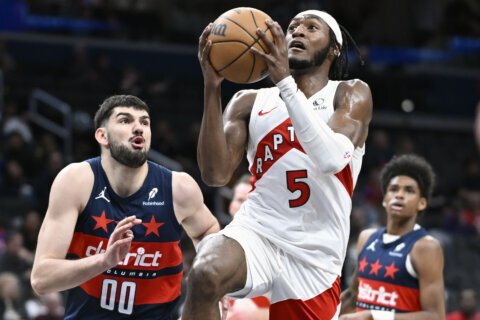Should the Wizards trade the 10th pick? originally appeared on NBC Sports Washington
Wizards president Tommy Sheppard said in the leadup to Tuesday night’s lottery that “most young guys, it’s really hard for them to make an impact in their first year.” Back in April, he said of the team’s glaring need at point guard that he doesn’t “see a rookie starting at point guard for [the Wizards] next season.”
While he may have simply been noting how young and inexperienced most lottery picks are these days, those comments sort of lend themselves to an obvious question: Should the Wizards consider trading the 10th overall pick? They can technically do so once the draft takes place, as it would no longer be subject to the Stepien Rule.
Trading it could go a few different ways. They could either trade up in the draft (or down) or trade the pick for more immediate help in a deal for a veteran. Wizards fans on Twitter are already deliberating over how the team could trade up for Jaden Ivey, who will likely land somewhere in the top-5 and would fill a need at guard.
Let’s start with that scenario. In short, don’t count on it. Usually, teams picking high enough to draft top prospects, ones as good as Ivey, don’t pass up the opportunity. In the age of supermax contracts, getting a young star on a rookie deal is the ultimate value play if you can swing it.
Regardless of who is available, you just don’t see it happen often. And when it does, teams usually pay a high price to move up as far as the Wizards would need to go get someone like Ivey.
The last two drafts saw no top-5 picks traded. In 2019, the Hawks moved up from No. 8 to No. 4, but it cost them a ton. They had to give up No. 8, the 17th pick in the same draft plus a protected 2020 first-round pick and a second-round pick. They got back No. 4 plus Solomon Hill and two second-round picks.
So, basically three first-round picks for one in order to move up four spots. That might be hard for the Wizards to do given their first-round picks from 2023 to 2026 are tied up in protections relating to the Russell Westbrook/John Wall trade.
That same year, the Timberwolves moved up from the 11th pick to No. 6. They did so by giving up Dario Saric, who at the time was a fairly valuable trade piece at 25 years old. That was a more manageable price to pay, one the Wizards could probably replicate. But Ivey is also unlikely to be there at six, barring something unforeseen.
Those would be the best examples of the last 10 years for the framework of a potential trade-up scenario for the Wizards. They know how difficult doing so can be, as they tried to trade up into the top five of the 2020 draft to no avail.
Trading the 10th pick for a veteran is more viable but would be a departure from the Wizards’ recent strategy of keeping their first-round picks, which has followed a stretch where they traded a bunch of them away. Washington has drafted in the first round each of the last four years after trading their pick three of the previous four years. Under Sheppard, who was promoted to oversee the front office in 2019, they have prioritized building through the draft.
The two potential problems with trading the pick for a veteran would be their mixed history doing so and the fact it could further squeeze their salary cap by swapping a player on a rookie contract for a veteran deal. As far as their history goes, they found some success trading first-round picks for Marcin Gortat and Markieff Morris, but botched their trade in 2017 for Bojan Bogdanovic, who left in free agency just months later and the pick they traded to Brooklyn translated into a future All-Star in Jarrett Allen.
There is also an all-time bad example that the Wizards can surely recall. Back in 2008, when Sheppard was the team’s assistant general manager, they traded the fifth overall pick to Minnesota for role players Mike Miller and Randy Foye. Those two were gone a year later, meanwhile the Warriors selected a guy named Stephen Curry with the seventh pick. Sheppard is likely wary of that happening again.
One route the Wizards haven’t really tried to this specific extent is using a first-round pick in a larger trade for something more substantial like a star, rather than a starter or for rotation depth. Perhaps they could give that a shot, though the 10th pick is only going to hold so much value in that type of scenario.
Given all that is detailed here, the Wizards have a lot to consider when it comes to potentially trading the 10th overall pick. Trading up seems unlikely, but maybe that pick will ultimately be the key to them getting the veteran starting point guard they covet.






